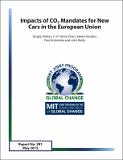| dc.description.abstract | CO2 emissions mandates for new light-duty passenger vehicles have recently been adopted in the European Union (EU), which require steady reductions to 95 g CO2/km in 2021. Using a computable general equilibrium (CGE) model, we analyze the impact of the mandates on oil demand, CO2 emissions, and economic welfare, and compare the results to an emission trading scenario that achieves identical emissions reductions. We find that the mandates lower oil expenditures by about €6 billion, but at a net added cost of €12 billion in 2020. Emissions from transport are about 50MtCO2 lower with the vehicle emission standards, but with the economy-wide emission trading, lower emissions in transport allow an equal increase in emissions elsewhere in the economy. We estimate that tightening CO2 standards further after 2020 would cost the EU economy an additional €24–63 billion in 2025 compared with achieving the same reductions with an economy-wide emission trading system. | en_US |
| dc.description.sponsorship | The paper benefitted from comments of participants on an earlier draft of the paper presented at a workshop on the EU fuels standards held in Brussels on February 26, 2015, organized by General Motors. The MIT Joint Program on the Science and Policy of Global Change, where the authors are affiliated, is supported by the U.S. Department of Energy, Office of Science under grants DE-FG02-94ER61937, DE-FG02-08ER64597, DE-FG02-93ER61677, DE-SC0003906, DE-SC0007114, XEU-0-9920-01; the U.S. Department of Energy, Oak Ridge National Laboratory under Subcontract 4000109855; the U.S. Environmental Protection Agency under grants XA-83240101, PI-83412601-0, RD-83427901-0, XA-83505101-0, XA-83600001-1, and subcontract UTA12-000624; the U.S. National Science Foundation under grants AGS-0944121, EFRI-0835414, IIS-1028163, ECCS-1128147, ARC-1203526, EF-1137306, AGS-1216707, and SES-0825915; the U.S. National Aeronautics and Space Administration under grants NNX06AC30A, NNX07AI49G, NNX11AN72G and Sub Agreement No. 08-SFWS-209365.MIT; the U.S. Federal Aviation Administration under grants 06-C-NE-MIT, 09-C-NE-MIT, Agmt. No. 4103-30368; the U.S. Department of Transportation under grant DTRT57-10-C-10015; the Electric Power Research Institute under grant EP-P32616/C15124, EP-P8154/C4106; the U.S. Department of Agriculture under grant 58-6000-2-0099, 58-0111-9-001; and a consortium of 35 industrial and foundation sponsors (for the complete list see: http://globalchange.mit.edu/sponsors/all). | en_US |

